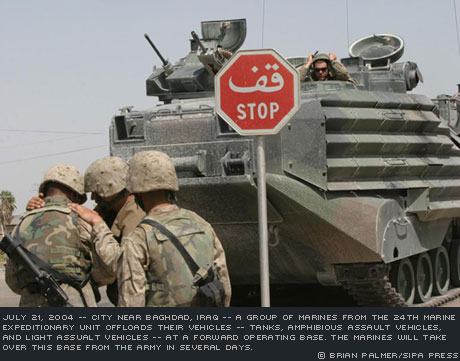|
|
 |
Heading
North
I am in Iraq, not far from Baghdad, at a US military camp. I arrived
a couple of days ago with a convoy of combat vehicles from Camp Virginia,
Kuwait. The Public Affairs Officer for the 24th Marine Expeditionary
Unit, with which I am traveling, asked me not to report the name of
the city where the camp is located until the entire MEU arrives. I
agreed.
This facility is worlds away from Camp Virginia and its morning and
evening softball games, bounteous chow hall, 24-7 Internet, and well-equipped
gym. A couple of days before I got here, a mortar attack killed two
US service members; several others were wounded. The soldiers and
Marines here wear flak jackets when they venture more than a few hundred
meters beyond their tents. Explosions of various sorts are not exactly
frequent, but they are certainly not rare. There is little obvious
mirth.
But this leg of the journey started days ago at Camp Virginia, a few
hundred kilometers to the south.
Convoy Training
"Convoy is the most dangerous thing going on up here," Lt.
Col Vincent Coglianese told a couple of visiting reporters before
a security exercise designed to sharpen skills Marines might need
on the long trip north. Faux villages peopled with plywood cutouts
of "friendlies" and green Munchkin-like "bad-guy"
dummies flanked the course, an unpaved sand road through an artillery
firing range. Junked and bullet-pocked cars lined the route. "The
civilians on the target line are NOT to be shot at," Lt. Adrien
Thom, commander for this particular convoy, reminded the Marines.
The group, enlisted men and women from the MEU's Combat Support Services
Group, came to the drill fully suited up for battle and already dribbling
sweat in the 120-degree heat. They only got hotter sitting in trucks
waiting for the order to roll.
The first run was "dry-fire," no shooting. Even a non-military
type like me could see the operation didn't proceed flawlessly. "It
was all supposed to go step by step," Lt. Thom told the exhausted
Marines after the drill. It didn't. Thom neatly dissected their performance
-- not enough situational awareness and too many people on the radio,
among other things -- balancing her firm critique with encouragement.
Lt. Thom stood out from the other dirty, sweaty Marines, though she
herself was exceptionally dirty and sweaty. Thom is part of a Marine
Dream Team of sorts, one of four female lieutenants in the Combat
Support Services Group, a rare cluster of women officers in the very
male Corps. This is a fact that the 27-year-old combat engineer from
Lafayette, LA, who served in Iraq last year, and her three female
comrades play down, way down. "We brush our teeth and wash our
hands more than they do," she quipped with a shrug when asked
what the typical grunt makes of women officers. Next question.
The live-fire run went off with fewer hitches. The Marines pumped
the dummies -- and the surrounding sand -- with hundreds of rounds
from their M-16 rifles and from M-240 machine guns.
|
 |
 |
|

